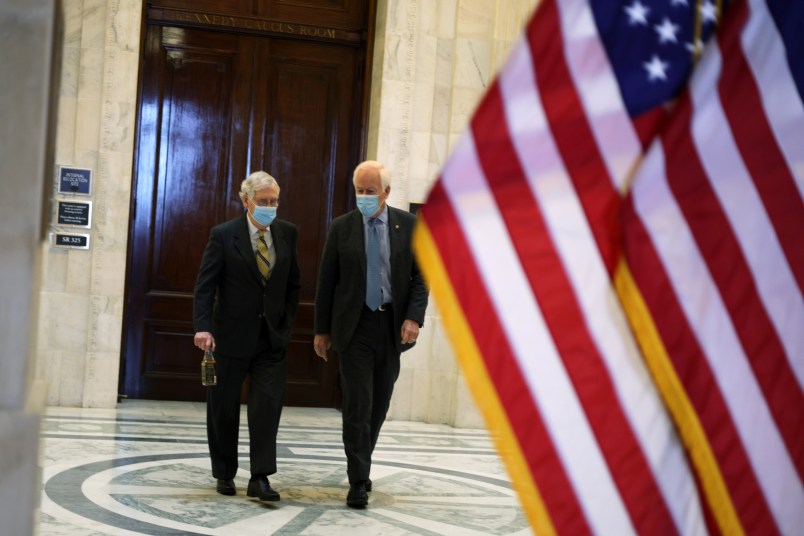Republicans have taken a philosophical turn when talking about President Joe Biden’s $2 trillion-plus infrastructure plan.
Creating a distinction between what counts as “real infrastructure” and what doesn’t, some have framed their opposition around the fact that much of the package deals with things other than roads and bridges.
“You look at this bill, the $2 trillion in the bill that, only about 5 to 7 percent of it is actual roads and bridges and ports and things that you and I would say is real infrastructure and that we tried to get passed under the last administration with President Trump,” former Office of Management and Budget Director Russell Vought said recently on Fox News radio.
That statistic is particularly misleading, as it doesn’t count even things like rail and water systems — improvements that fall into the traditional infrastructure bucket.
But it’s a dry run of what now seems to be the official GOP line of attack, based on an internal memo within the Senate Republican conference circulated Sunday. The memo was first obtained by Politico.
“Eleven days ago, President Biden laid out a partisan plan to kill jobs and create slush funds on the taxpayer dime,” it reads. “Described as both a ‘jobs plan’ and an ‘infrastructure’ plan, the proposal undermines both.”
It includes the 5 percent statistic, claiming that most of the rest of the bill is larded up with Democratic priorities like “expensive green energy mandates” and a “flurry of tax hikes.”
Some part of that semantic argument is grounded in reality. With the filibuster in its current state, preserved by a lack of sufficient Democratic will to change or eliminate it, reconciliation is the only path Democrats can use to get big policy changes into law. Consequently, they’ve been crafting very large bills — like the American Rescue Plan — to get as much done as possible in the very few reconciliation vehicles they have.
Senate Majority Leader Chuck Schumer (D-NY) is seeking a way around that limitation, saying last week that he won over the Senate parliamentarian to his argument that the budget law actually allows for even more reconciliation bills. But it’s unclear how that will play out practically, or if moderates like Sen. Joe Manchin (D-WV) will allow more legislation to pass on a simple majority vote.
But, as Sen. Marsha Blackburn (R-TN) has proven, the “real infrastructure” argument is replete with political potholes.
Her tweet last week of a graphic showing that $400 billion of the plan is slated for elder care with the caption “President Biden’s proposal is about anything but infrastructure” garnered a brutal ratio on Twitter. Many mocked her use of scare tactics in connection to a measure that seems like an innocuous good for an often mistreated population.
President Biden’s proposal is about anything but infrastructure. pic.twitter.com/fRtbPqg7QK
— Sen. Marsha Blackburn (@MarshaBlackburn) April 7, 2021
The Republican fixation on “real infrastructure” that the package lacks also risks dismissing actual needs that their constituents have.
Biden has aggressively touted the broadband expansion in his plan, saying that “high speed internet is infrastructure.”
Many rural areas in particular lack access to affordable, high-speed internet, making it an issue Republicans are usually fairly passionate about. But their wholesale dismissal of anything in the package that isn’t roads or bridges makes it difficult for members to support its proposals, even on topics usually in their legislative wheelhouse.
“There is widespread bipartisan support for increasing access to high-speed internet, particularly in rural areas,” a Senate Republican aide recently told the Wall Street Journal. “There is zero bipartisan support for tying this overwhelmingly popular issue to a massive tax increase on American businesses still reeling from a once-in-a-century pandemic.”
That dynamic played out with the American Rescue Plan too. When Republicans decided on all-out opposition against the package, some were left trying to half-tout parts of the bill they actually liked. Sen. Roger Wicker (R-MS) was the poster child for that, thoroughly thwacked on Twitter for highlighting a part of the law he supported after voting against it.
Read the memo here:







To quote @emiliano4 in another thread:
This is a “jobs bill”, nt n infrastructure bill. No need to argue over bs.
“Okay. Which popular job creating items would you like to defund, then?”
Should be every media followup to this tactic.
“We can reduce the costs simply by cutting out these twenty states from the recipients of the money in this bill…”
American businesses benefit from uni. high speed internet service in both the rural and urban areas. The tax is just a small issue that they’ll deal with in the long run in other ways. Oh, I’m sure they’ll bitch and moan over it but, in the end, int’l. major corporations. will get over it.